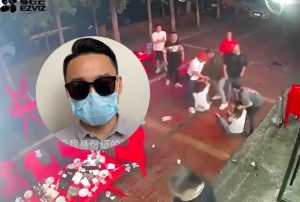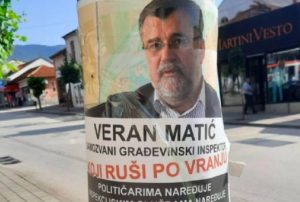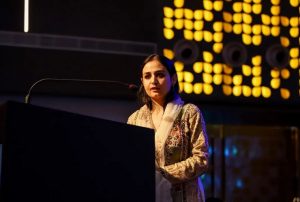London – Within a month, two separate cases in Italy show that even in Europe, journalists are victims of judicial harassment in their attempts to intimidate and restrict the work of the press.
Paolo Mondani of the investigative journalism program Report hosted a special show on the 30th anniversary of the murder of Judge Giovanni Falcone, a turning point in the fight against the mafia. After the scan, the Public Ministry of a Sicilian town issued a search and seizure warrant on his home and newsroom.
Weeks later, it was the turn of the journalist Francesco Pesante, administrator of the L’Immediato website, to be summoned by the authorities to testify about a report on the portal. In both cases, Italian justice sought the same thing: to declassify the source, the fundamental principle of journalism.
Italian journalist’s phone seized
Finally RSF Press Freedom RankingItaly was ranked 58th in an assessment covering 180 countries, fully highlighting the risks posed to journalists investigating crimes, particularly organized groups.
In the Pesante case, however, the threat did not come from the criminals, but from the judicial system, which inflicted judicial harassment on the journalist after a report using security camera footage from a prison.
On 22 June, the journalist from L’Immediato was questioned by police in the southern city of Foggia, after being briefed by the authorities the day before.
Security officials told Pesante that government information was suspect in the “leak investigation”. The accusation was based on an article published on the journalist’s website on 18 May.
The report used security footage from a Foggia prison to report the murder of a man there. The victim was serving his sentence but was allowed to go to work. The crime occurred when the man was shot on his way back into custody.
Also Read | Diversity| More organic acceptance of immigrants in Italy did not increase media participation
During questioning, officers questioned Pesante about his sources and how L’Immediato obtained these images. In an interview with the Committee to Protect Journalists (CPJ), she said she refused to respond, citing journalistic privacy.
He added that the vehicle was not the only person using the images published in other Italian media.
The journalist was released free of charge by the authorities hours later, but his mobile phone was confiscated at the request of the local prosecutor.
His lawyer, Michele Vaira, said authorities were looking for messages about security camera footage stored on the phone.
The device was returned to Pesante a day later. If accused and convicted of revealing state secrets, the press specialist can be sentenced to up to five years in prison, according to Italian penal code.
Authorities are also investigating the involvement of two unidentified police officers in the leaking of the footage, the journalist told local media.
CPJ condemned the action of the Italian authorities, amounting to judicial harassment, against the practice of the journalistic profession:
“The seizure of Pesante’s phone violated the basic principles of freedom of the press and threatened her ability to protect her resources.
Such measures have no place in an EU country and authorities should encourage and support journalists covering organized crime.”
Also Read | Arrest of journalist covering gender crime shows progress in persecution in China
Another journalist harassed by justice, not mafia
In another incident, a crime that traumatized Italy 30 years ago challenged authorities once again fighting the country’s mafia, and justice took an extreme measure of judicial harassment against the press: an attempt to breach the confidentiality of sources. He is a prominent journalist from the state-owned RAI, the largest Italian television network.
Paolo Mondani, an Italian media celebrity, is a reporter for the investigative journalism program Report.
A report shown in May was the subject of a police investigation to reconstruct the murder of Judge Giovanni Falcone, the victim of the May 23, 1992 bombing in the city of Capaci by the Sicilian mafia.
The bombing killed Falcone, his wife, and three members of his police escort.
The magistrate was involved in the case against members of Cosa Nostra, a criminal organization operating in Sicily. Operation Clean Hands, a hunt for gangsters, was launched after his death.
The journalist’s program is called La Bestia Nera (The Black Monster), which refers to a house that will serve as a bunker for a mafia operation.
Documents and characters were presented that “could shed new light on the facts” claiming that far-right politicians and mobsters will work together to silence Falcone and another judge, Paolo Borsellino, who was murdered after him.
Judicial harassment of the journalist of the RAI Report began a month before the release of the report on the crime committed by the mafia.
Mondani was summoned to court by Caltanissetta’s prosecution in the case, some of whom requested detailed information about his meetings with former police officers.
According to the information given by ANSA agency and La Repubblica newspaper, after the publication of the episode, the search and seizure authority came from the Public Ministry from Caltanissetta, Sicily.
On May 24, teams from the Italian Anti-Mafia Investigation Directorate (DIA) searched the newsroom of the “Report” and the house of journalist Paolo Mondani.
In an interview with CPJ, the journalist said that agents have the power to seize digital and paper documents.
Also Read | In unusual harassment, poster prints journalist’s face ‘wanted’ on streets in Serbia
Sigfrido Ranucci, the presenter of the report, which was posted on Facebook during the police action in the program’s newsroom, told ANSA news agency.
According to the journalist, the police were looking for “documents and witness statements.” [do atentado da máfia em 1992] on mobile phones and computers.
Mondani told CPJ that the search warrant was revoked by the prosecution while the search was ongoing, before police confiscated any of his or RAI’s material.
However, according to the journalist, this was because, in a separate action that took place at the same time, the authorities found a classified document they were looking for in the home of a former police officer.
The police did not access Mondani’s private devices.
However, the orders presented revealed that he and his reporting team were secretly tracked and filmed by agents during their conversation with a key source about the attack on Judge Falcone. Anti-mafia police also blocked the journalist’s phone calls.
Also Read | India bans Pulitzer Prize-winning Reuters photojournalist from traveling abroad
CPJ’s European representative, Attila Mong, condemned the Italian court’s action against Report’s newsroom and journalist:
“It has no place in a member state of the European Union to break into newsrooms and journalists’ homes, and to search and monitor newsgathering activities.
Authorities should refrain from actions that compromise the confidentiality of sources that could have a chilling effect on the work of journalists.”
Caltanissetta prosecutor Salvatore De Luca told the ANSA news agency that the journalist is not under investigation and calls are being made to confirm the authenticity of the sources.
In a note posted on the program’s website, Mondoni criticized the police crackdown and said the statements of two sources, Alberto Lo Cicero and Maria Romeo, featured in the report “have long been known” to the DIA. and the Caltanissetta Public Department.
“It’s surprising that these statements are only now being investigated, 30 years after the crime,” he said.
read it too
source: Noticias
[author_name]



